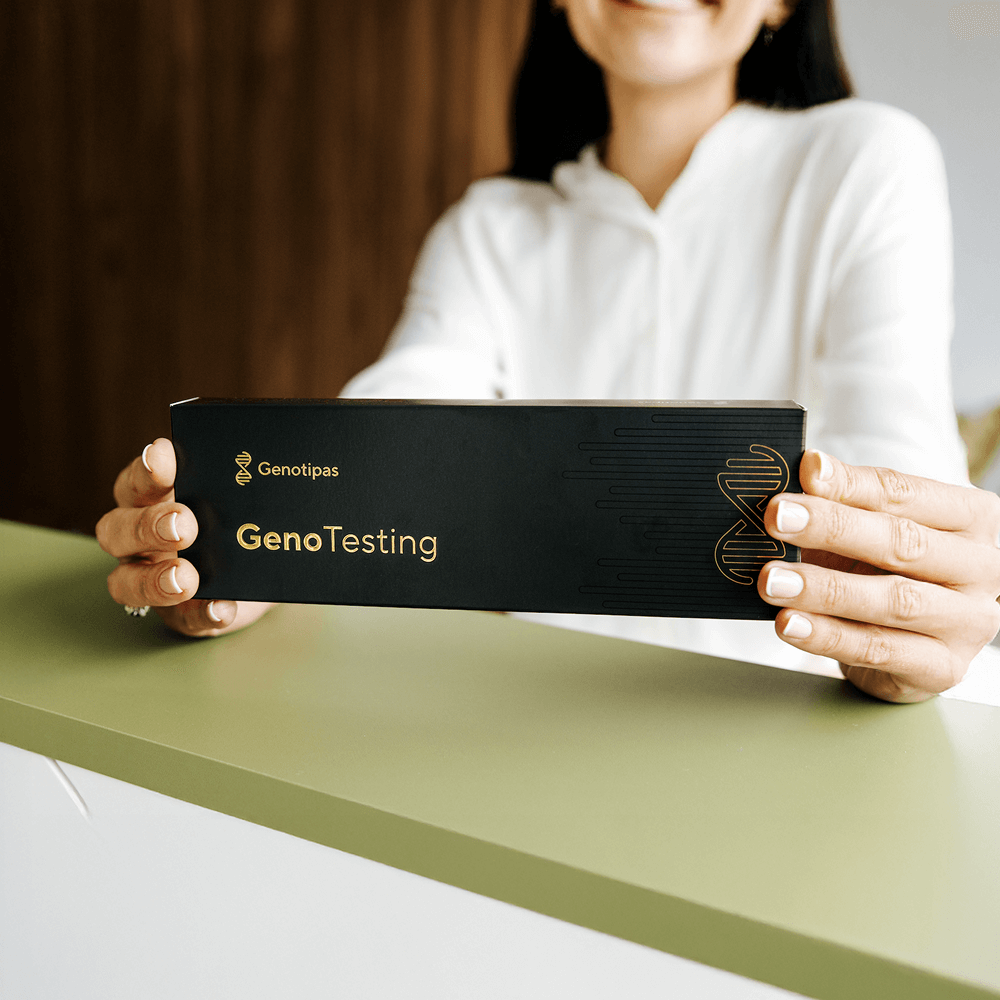Nutrition Test GenoTaste™
An innovative genetic test that analyzes more than 100 single nucleotide polymorphisms (SNPs) related to eating habits and food tolerance. The test evaluates both genetic predispositions and the patient’s condition and goals.
Precision nutrition starts with your DNA
Genetic factors alone can explain as much as 40–70% of body mass index (BMI) differences, which is why the same diet works for one person but not for another. GenoTaste analyzes more than 100 SNPs and reveals how your DNA regulates appetite, metabolism, and nutrient absorption. By understanding these predispositions, you can choose foods that truly suit your body, reduce disease risk, and achieve lasting results.
Which nutrition-related genes does GenoTaste analyze?
The GenoTaste test analyzes more than 100 genetic markers related to your body’s response to different nutrients. It helps you understand why some foods may be beneficial, while others may affect your well-being or hinder your goals. The main areas of analysis include:
Absorption of macronutrients (fats, proteins, carbohydrates)
Predisposition to snacking, hunger and satiety regulation
Specifics of micronutrient (vitamins and minerals) absorption
Genetic markers for lactose, glucose, and gluten intolerance
Rate of caffeine and alcohol metabolism
Physical activity tolerance and genetic predisposition to body weight gain
Personalized nutrition: when your menu is written by your genes
Discover how your genes influence nutrient absorption, appetite, and metabolism. The test report provides concrete, science-based actions to help you balance your diet, lower disease risks, and improve your well-being in the long term.
Personalized nutrition plan
The analysis of more than 100 SNPs defines the optimal ratio of proteins, fats, and carbohydrates and provides a weekly menu tailored to your goals and lifestyle.
Tips for reducing snacking
Genetic insights into satiety hormones help you manage hunger signals. The report offers practical strategies to reduce cravings for sweets or fast food.
Healthier food alternatives
The product compatibility report ranks hundreds of foods from the most beneficial to those best avoided, making it easy to find healthier substitutes for your favorite meals.
Insights on supplement needs
Based on genes influencing vitamin and mineral metabolism, the report gives personalized recommendations on which nutrients — and in what doses — may support your health.
Do the GenoTaste test without leaving your home



When and for whom is the test recommended?
For those who want to optimize nutrition for better health and sports performance
The precise ratio of macronutrients helps maintain a healthy weight and improve endurance.
For people who constantly try different diets without long-term results
You will discover your hunger tendencies and receive a sustainable plan without overeating.
For individuals with excess weight, elevated cholesterol, or high glucose levels
Personalized guidelines help lower LDL cholesterol, stabilize blood sugar, and support weight control.
For athletes aiming for energy and fast recovery
Tailored nutrition and supplements provide more energy and accelerate muscle recovery.
"GenoTaste helped put everything in place. It turns out my body is very sensitive to fast carbohydrates, and certain genes cause slow fat metabolism. Based on my genetics and product list together with a dietitian we made a meal plan. No hunger, no stress – just eating what suits me. I lost 9 kilograms in 4 months, but most importantly – I finally feel good in my body."
GenoTaste reliability: the numbers behind precision and quality
GenoTaste analyzes more than 100 DNA markers and your nutrition-related traits to provide personalized recommendations. Everything is done conveniently at home – in just three simple steps.
Test sensitivity reaches 99%
10,000+ samples analyzed for clinical validation
Tests performed in an accredited laboratory under ISO 13485 standard
A genetically grounded nutrition plan
Order the GenoTaste test and receive recommendations tailored specifically to you.

For Specialists
All essential information in one place – from the genes analyzed to test accuracy and clinical value. This section is intended for professionals seeking to understand in detail the foundation, structure, and practical applications of the test.
If a patient constantly struggles with weight management, fails to achieve long-term results from diets, or finds it difficult to follow a nutrition plan due to appetite regulation issues, genetic factors may be the underlying cause. The test helps personalize nutritional solutions based on biological traits.
The test is grounded in the science of nutrigenetics. It analyzes more than 100 SNPs related to food tolerance, nutrient absorption, metabolism, and appetite regulation. In addition to genetic data, it also considers the patient’s lifestyle, eating habits, and individual goals.
The patient-oriented report is presented clearly and understandably, even without medical training. It includes:
• Individual genetic predispositions
• Nutrition and lifestyle recommendations
• Supplement recommendations divided into 3 groups according to nutrient absorption
• Action guidelines for improving health
A second, detailed version of the report is designed for nutrition specialists. It provides each tested SNP variant, its effect, and interpretation. Based on these data, an individualized nutrition and lifestyle plan can be created, aligned with the patient’s goals and health needs.
An additional part of the test is a detailed food compatibility report. It ranks various food products according to their suitability for a particular patient, taking into account micronutrient needs and genetic traits.
The specialist report provides not only general insights but also specific recommendations regarding food supplements – including types, importance, and possible formulations based on the patient’s genetic metabolism.










